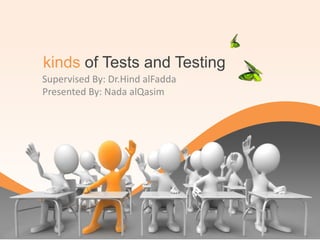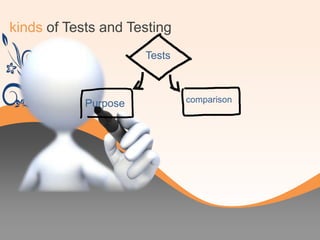My Presentation
- 1. kinds of Tests and Testing Supervised By: Dr.Hind alFadda Presented By: Nada alQasim
- 2. kinds of Tests and Testing Tests Purpose comparison
- 3. kinds of Tests and Testing What does test mean? What do Language tests mean?
- 4. Section No.1 The purposes for which Proficiency Tests language testing is carried out. Placement Achievement test Tests Diagnostic tests
- 5. Proficiency Tests Proficiency tests are designed to measure peoples ability in a language, regardless of any training they may have had in that language. The content Examples
- 7. Section No.1 The purposes for which Proficiency Tests language testing is carried out. Placement Achievement test Tests Diagnostic tests
- 8. Achievement Tests Achievement tests are directly related to language courses  Measure how successful students are in achieving objectives of a lesson/course/curriculum  Closely related to the content of a particular lesson/course/ curriculum
- 10. Achievement Tests There are two kinds of achievement tests. • achievement tests are Final those administered at the end of a course of study. • achievement tests are Progress intended to measure the progress that students are making.
- 11. Section No.1 The purposes for which Proficiency Tests language testing is carried out. Placement Achievement test Tests Diagnostic tests
- 12. Diagnostic Tests Diagnostic tests are used to identify students’ strengths and weaknesses.
- 14. Section No.1 The purposes for which Proficiency Tests language testing is carried out. Placement Achievement test Tests Diagnostic tests
- 15. Placement Tests Placement tests are intended to provide information which will help to place students at the stage of the teaching program most appropriate to their abilities. Typically they are used to assign students to classes at different levels.
- 17. Group Activity
- 18. Section No.2 Direct/indirect Discrete/integrative Computer Norm/criterion Objective/subjective
- 19. Direct versus Indirect Kinds of tests according to test construction Testing is said to be direct when it requires the candidate to perform precisely the skill which we wish to measure. For example, speaking. Indirect testing attempts to measure the abilities which underlie the skills in which we are interested. At first the old woman seemed unwilling to accept anything that was offered her by my friend and I.
- 20. Discrete point versus integrative testing Kinds of tests according to test format Discrete point testing refers to the testing of one element at a time, item by item. Integrative testing requires the candidate to combine many language elements in the completion of a task
- 21. Norm reference versus cretierion reference Kinds of tests according to Score interpretation Norm-referenced test is a test which is designed to give information about how the student performed on the test. It relates one candidate’s performance to that of other candidates. Criterion-referenced test is a test which is designed to provide information about what the candidate can actually do in the language directly.
- 22. Common European Framework of References for Languages Basic User A1 Can understand and use familiar everyday expressions and very basic phrases aimed at the satisfaction of needs of a concrete type. Can introduce him/herself and others and can ask and answer questions about personal details such as where he/she lives, people he/she knows and things he/she has. Can interact in a simple way provided the other person talks slowly and clearly and is prepared to help.
- 23. Common European Framework of References for Languages Proficient user C2 Can understand with ease virtually everything heard or read. Can summarise information from different spoken and written sources, reconstructing arguments and accounts in a coherent presentation. Can express him/herself spontaneously, very fluently and precisely, differentiating finer shades of meaning even in more complex situations.
- 24. Objective test versus Subjective test Kinds of tests according to scoring procedure In objective test tasks , raters do not have to make a judgment because the scoring is unambiguous. For example: multiple choice test. In subjective test tasks, raters have to make a judgment when assessing candidates' performance. For example: marking of an essay
- 25. Computer adaptive testing Saves time and effort Start with average level of difficulty, lower/increase levels of difficulty according to test taker’s performance Needs a bank of items graded by difficulty
- 27. Group Activity


























